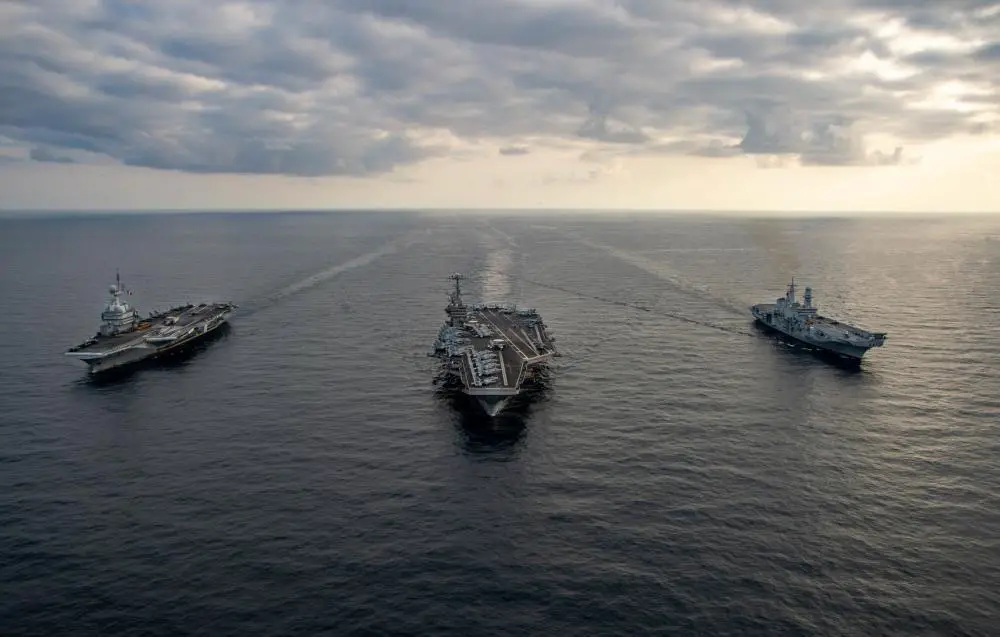Naval forces from France, Italy and the U.S. conducted tri-carrier joint operations in the Ionian Sea, Mar. 17, in direct support of NATO security operations. The Harry S. Truman Carrier Strike Group (HSTCSG) integrated with the French carrier FS Charles de Gaulle’s (R 91) Task Force 473 and ITS Italian carrier Cavour (C-550) to further enhance interoperability. Elements of the French, Italian and U.S. maritime forces routinely operate together, fostering a cooperative approach toward regional security and stability. This was an opportunity to bring together three strategic allies to strengthen the combined capabilities with NATO and other allied countries.
“We are plugged in very closely with our NATO partners who bring tremendous capacity in ships and aircraft. The interoperability we build by doing these exercises ensures maximum capability of our combined maritime forces. The capabilities of a U.S. aircraft carrier strike group are made exponentially stronger by operating alongside our allies and partners. Adding the French and Italian carrier teams provides an exciting chance to demonstrate that the whole is truly greater than the sum of its parts,” said Rear Adm. Curt Renshaw, commander, Carrier Strike Group 8.
“The Cavour is a part of broader activities aimed at increasing our ability to operate within the alliance,” said Italian Navy POC. Leveraging every possible interaction to improve the level of interoperability on the NATO forces is crucial to international security and stability.”

The convergence of three allied aircraft carrier strike groups allowed for the ability to conduct a series of tactical missions designed to maximize air defense capabilities and extended the reach of long range precision maritime strikes from carrier-based aircraft in a rapidly evolving area of operations. The HSTCSG recently participated in the NATO-led activity Neptune Strike 22. The activity practiced the handover of the HSTCSG to NATO command and control, highlighting the natural evolution of NATO’s ability to integrate the high-end maritime warfare capabilities of a carrier strike group to support the defense of the NATO alliance. The Italian aircraft carrier ITS Cavour (C-550) and elements of its associated carrier strike group also participated in Neptune Strike 22, strengthening their maritime partnership with both the U.S. and together as NATO.
“Operating alongside our NATO allies is a primary objective of our Clemenceau 22 deployment,” said French Rear Adm. Christophe Cluzel, commander, Task Force 473. “Events like this enhance our interoperability to operate together and strengthen the exchanges with our NATO partners, essential to European security in this strategic area.”

Elements of the strike group include the staff of Carrier Strike Group 8; flagship USS Harry S. Truman, commanded by Capt. Gavin Duff; the nine squadrons of Carrier Air Wing (CVW) 1, commanded by Capt. Patrick Hourigan; the staff and guided-missile destroyers of Destroyer Squadron (DESRON) 28 commanded by Capt. Todd Zenner, which include: USS Gonzalez (DDG 66), USS Bainbridge (DDG 96), USS Gravely (DDG 107); the Royal Norwegian Navy’s Fridtjof-Nansen class frigate HNoMS Fridtjof Nansen (F310) deployed as part of the Cooperative Deployment Program; and the Ticonderoga-class cruiser USS San Jacinto (CG 56), commanded by Capt. Christopher Marvin. USS Cole (DDG 67) and USS Jason Dunham (DDG 109) are also part of the carrier strike group and currently supporting U.S. Fifth Fleet Area of Operations. The strike group is on a scheduled deployment in the U.S. Sixth Fleet area of operations in support of naval operations to maintain maritime stability and security, and defend U.S., allied and partner interests in Europe and Africa.
The Charles de Gaulle Carrier Strike Group current deployment, named Clemenceau 22, contributes to the defense of the eastern flank of the Alliance and brings together a variety of allied resources, including the Arleigh Burke-class guided missile destroyer USS Ross (DDG 71). The Harry S. Truman Carrier Strike Group is on a scheduled deployment in the U.S. Sixth Fleet area of operations in support of naval operations to maintain maritime stability and security, and defend U.S., allied and partner interests in Europe and Africa.
















